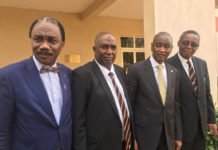It is a great privilege, honor and pleasure for me to welcome our distinguished Military Administrator, His Excellency, Col. Moses Fasanya, distinguished Jurists, and Legal Practitioners, Statesman, and all other distinguished Ladies and Gentlemen from our State and beyond to this maiden workshop on Law Reform organized by the Nigerian Bar Association, Aba Branch.
The theme of this workshop is ‘’Towards More Meaningful Legislation and Predictable Litigation’’. From our theme, two issues have been chosen for discussion today. One concerns the nation as a whole – that is, ‘’Litigation on Land after Sadiku’s Case’’, while the other focuses mainly on our state, that is, ‘’Some Legislation in Abia State; Set-Back to Administration of Justice and Rule of Law’’.
The first topic was chosen to give us an opportunity to make suggestions for the reform of the Land Use decree in view of the recent pronouncements of the Supreme Court on the application of the Land Use Decree. As we all know, life depends on land and if the laws on land are uncertain, so will our life remain uncertain.
The second topic was chosen due to the peculiar circumstances of our state.
As it is known, Abia state Laws have its traditional/historical link with the old Imo state, the formal East Central State and the defunct Eastern Region, and the commonest feature of the legal history of these entities is that no significant attempt or more fairly, no attempt was made to revive and reform their laws.
Abia State inherited those antiquated, backward, primitive and meaningless laws from her ‘’Parents’’ and no attempt has been made up till today to revive and reform these laws. The laws applicable in Abia State can be categorized as follows:
The Common Law and Equity of England
The introduction into England of the Common Law dates back to the 11th Century. Half of the laws applicable in Abia State are derived from the Common Law. These English customs which is what Common Law is, formulated between the 11th and 19th century still applies in Abia State even when in some cases it has become impossible to marry with our local circumstances.
Statutes of General Application in England as at 1st January, 1900
It is impossible to believe that in 1998, about 105 laws made by the English people before 1st January, 1900 and mainly between the 14th and 18th century is still applicable in Abia State. It must be noted that most of these laws are no longer law in England and so their texts are no longer printed or available on sale for the Nigerians to purchase. The current English Law textbooks deal with their current laws and not those obsolete laws made before 1st January, 1900; but in Abia State what we need are the obsolete English Law textbooks to be able to know the laws applicable in our state as only the obsolete English laws are presently relevant to us. There is no way this state of the law cannot adversely affect the administration of justice. Even the continued blanket application of English Laws made before 1900 to our state is derogatory on our conscience as a people.
Laws of Eastern Region
Another bulk of the Law applicable in Abia State is the Laws of Eastern Nigeria. Many of the laws contained in this set are obsolete, inapplicable, and inappropriate for our circumstances today. The laws of Eastern Nigeria are also out of print.
Laws Made in East Central and Imo State
Most of the laws made in the then Imo/East Central State were amendments of some of the Laws of Eastern Nigeria. There are several and numerous amendments that have made the work of today’s draftsmen very impossible because of the loss of count in identifying these sometimes conflicting amendments.
Laws made in Abia State Proper
These fall into the same category with that of East Central/Imo State. In addition, as the lecturers and lead discussants will be highlighting, some of these laws are clearly working against the administration of justice and Rule of law.
A people’s civilization has been said to be based on the degree in which justice is actually realized and no such justice or civilization can ever be realized in a state of lawlessness. A state of bad laws is a state of lawlessness; a state of unjustified laws, constitute a state of lawlessness, a state of laws contrary to the will of the people is a state of lawlessness; a state of meaningless, absurd and ambiguous law is a state of lawlessness. It is like having no law at all.
Today’s workshop is very significant in that, we have all chosen to play the role of the State, to assist the State, since Law Reform activities like workshop is normally financed, sponsored and organized by the State.
I salute you all for being part of this community developmental effort and in particular, I commend our co-sponsors namely: Mr. E. C. Duru, Chairman of the Workshop Committee; Ukpai Ukairo, Legal Practitioner; Hon. Justice Uzokwe (Mrs); His Royal Highness Eze Okosisi; The Nigerian Breweries; The Aba Textile Mills Limited and Aba South Local Government. These organizations and individuals have facilitated this workshop. We shall ever remain grateful to them.
We salute the lecturers today, Messrs C. O. Anah and Obiora Obianwu who not only agreed to play this part free but also spent their own money in printing their papers. We also salute specially Major Naingba for assisting us in making sure this workshop is a success. We greet the kindness of His Excellency in agreeing to attend this workshop even with the circumstances surrounding the short notice inviting him to this workshop and almost breaking his protocol and honoring us with his presence.
We have a duty in this workshop to discuss the laws that trouble the Administration of Justice and Rule of Law in this State and beyond.
We may want to review the problems posed by such laws like Sanitation Law/ Environmental Laws, Water Bore Hole Laws, Rent Edict.
We may want to know if these problems associated with these laws are caused by our Judges or Magistrates in their understanding and interpretation of the Laws or the lack of mental strength of our solicitors to pursue clients rights in court to its logical conclusion, or the reluctance of litigants to pursue their rights or the stiffness of the laws themselves.
Why would the State not give the citizen water yet they impose huge levies for inspection of private water bore holes. The State contract out the disposal of refuse yet these contractors would not dispose the refuse and still yet they are allowed to extort large penalties for work not done with the assistance of the Magistrates. If we must allow contractors to take up refuse disposal, then it is the duty of the State to insist that they be paid only when they do the work. They should not be allowed to reap where they did not sow.
Our guest lecturers and lead discussants are very well armed to lead the way in today’s discussion. Since we have come to equity with clean hands and have shown by this workshop our willingness to assist the State Government and its administration, we believe the State Government will reciprocate our gestures by making use of the suggestions this workshop will offer today, the first step being in setting up a taskforce for Law Reform.
But no law can have meaning if the machinery for its interpretation does not exist. Today in Abia State, the machinery for the interpretation of our laws hardly exists – that is to say, the Judiciary. We are aware that the problem of the Judiciary in the State was not created by the present administration and that if earlier governments had done their bit, we would not find ourselves in the state we are now.
We, of course, must salute His Excellency for the recent ceremonial dresses purchased for our judges, the funds released recently for the purchase of library books, and the assistance being given to the Armed Robbery Tribunal.
If His Excellency is fully and properly briefed, His Excellency will come to appreciate the alarming state of retrogress our Judiciary is in. We truly and honestly beg His Excellency to listen to us and redress the situation. We believe His Excellency will leave a legacy behind in our state and would be the leader that transformed our primitive laws and primitive judiciary into a civilized world.
One becomes breathless each time there is an attempt to catalogue the woes of the Judiciary in the State, some of which are;
No Housing For Judges.
Some of our judges commute to their courts of sitting from unbelievable distances because they are not housed within the area of their jurisdiction, yet Government Quarters in the GRA’s in Aba and Umuahia have continued to be sold to private businessmen and individuals. We appeal to His Excellency to intervene and revoke these sales in the public interest. The two judges in Ohafia reside in Aba, one judge in Umuahia still commutes from Abakaliki in Ebonyi State, one judge in Umuahia lives in Owerri, Imo state, another in Aba lives in Owerri, Imo State, one in Osisioma lives in Ohafia. On the whole, most other judges in Abia State live in rented block of flats and apartments in high density areas of our towns – and these are Judges!!!
No Vehicles For Judges
There are about 16 High Court Judges and 4 Customary Court of Appeal Judges in the State. More than half of these judges have not been given official cars. Some who possess official cars possess dead ones. Some of them without official cars do not even own private ones too, with the result that some of our Judges commute by public transportation. Where then is their independence, and justice? How can we entrust the position of a JUDGE of God to our Judges who cannot even afford from their fuel stipend to pay N30.00 to N35.00 a liter to buy petrol which is the current though illegal pump price; how can we entrust Justice, our lives, our future to Judges who will continually depend on litigants to transport them to court, provide money for the purchase of primary things such as Court Record Books, Court Halls, Typewriters, Furniture for their Offices and so on? Meanwhile, some of the old, sometimes unserviceable equipments in the court premises like in Aba are being lost daily to thieves due to the absence of concrete fencing-around these premises.
Appointment of More Judges
While praying for the State’s assistance to re-invigorate the Judiciary, we would also wish to remind His Excellency of the need to appoint more judges, particularly now that about 3 of our judges would be retiring this year. While pushing names for such appointment, let His Excellency insist that only upright, and God fearing persons are presented, and that the Bar had made an input.
We also wish that MILAD will create an additional Armed Robbery Tribunal in Umuahia and appoint retired Judges to preside in these tribunals. This will assist the manpower needs of the normal courts.
We pray that God will give His Excellency the opportunity to be our true Law Giver and the savior of our Judicial System and Administration of Justice, for we, are drifting to a point of total breakdown which may lead to disintegration of law and order.
Because the courts do not sit and cannot function in the true spirit, litigants are more and more abandoning lawful judicial settlement and intervention to taking the law into their own hands.
The lawyers are reaching their limits. The judges have reached their limits. Take up this fight for us, for posterity sir.
To all participants, I ask you to deliberate well.














Keep on working, great job!